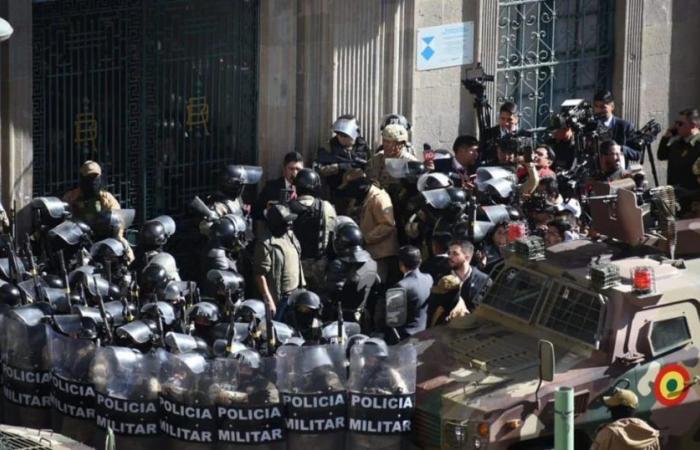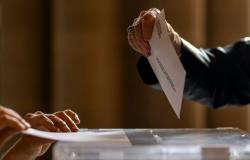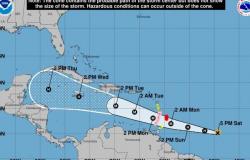
(from Santa Cruz de la Sierra, Bolivia) A new High Military Command, two former commanders of the Armed Forces imprisoned, the announcement of possible arrests of more military and civilian personnel, great public confusion and the deepening of a long political crisis and fierce bitterness between Luis Arce Catacora, Evo Morales and leaders of the opposition, mark the day after the anxiety over the seizure of the Burnt Palace with tanks and weapons.
Bolivia quickly went from confusion and unanimous condemnation to the military coup, led by General Juan José Zúñigato an intense political debate of two clashing narratives, just 15 months before the next presidential elections.
On the one hand, the Government’s version claims to have successfully quelled an attempt to military coup. On the other hand, the story of Evo Morales’ followers and opposition sectors defines what happened as “a self-coup”, “a political show”, “an adventure”, “a parody“, “a pantomime” either “a montage” by Luis Arce Catacora, agreed with General Zúñiga and his followers, to victimize the President and raise his popularity, at a critical moment due to the protests of various social sectors due to the lack of dollars in the economy and the queues at pumps to get fuels.
The first hours after the most complicated crisis of the three years and almost eight months of Arce Catacora’s management have been dominated by a series of interventions by various ministers in the television media to reinforce the thesis of the coup d’état, due to a strike and blockades in the city of El Alto to “defend democracy”, due to vigils in Plaza Murillo in favor of the Government and due to announcements of mobilizations by social organizations related to the President.
On the other side, the followers of Arce’s biggest opponent, former President Evo Morales, went from rejecting the military coup to a strong offensive against the Government, which is now accused of sponsoring “a self-coup.” Parliamentarians from the so-called “evista wing” of the MAS and leaders of social movements related to Evo Morales assured that Zúñiga’s military uprising “was an armed media show” to divert attention from Arce’s poor economic management, victimize the president and affect to Evo Morales.
The imprisoned governor, Luis Fernando Camacho, has also referred to the coup hypothesis as “a fraud.” Other opponents, such as former president Jorge Quiroga, defined what happened on Wednesday as “an embarrassment for Bolivia at an international level.” Former presidential candidate Samuel Doria Medina has joined opposition parliamentarians in calling for an investigation to determine whether there was a “coup” or a “self-coup.”
The “self-coup” theory was fueled by the explosive statements made by General Juan José Zúñiga at the time of his rapid arrest in the presence of the Deputy Minister of Internal Affairs, Police General Jhonny Aguilera.On Sunday I met with the President at La Salle School and asked me to do something to raise his popularity. He authorized me to take out tanks,” Zúñiga said.
To reinforce the theory of an attempted military coup, the Minister of Government, Eduardo del Castillowho described General Zúñiga as a “delinquent” at the time of his presentation to the media, assured that the armed insurrection had three weeks of preparation and the President had already warned days ago of a possible shortening of his mandate.
For his part, the Minister of Defense explained the possible reason for the anger of the arrested soldiers. “We summoned General Zúñiga on Tuesday for a statement he made to a media outlet with which the Government did not agree. We told him that we were going to relieve him along with other commanders. He apologized and said that he would accept any decision. On Wednesday I was defining the names of the new High Military Command and they notified me of the armed movement that had been formed in Challapata, led by Zúñiga,” said the minister.
The government’s discomfort with the now-detained former Army commander arose from his controversial statements about Evo Morales, in which he made it clear that he would not allow the former president to exercise the office of governor again or run in the 2025 elections because he is disqualified.
Zúñiga’s statement triggered the protest of “evismo”, since the military is prohibited from deliberating and engaging in politics. The Puebla Group also joined the protest.
The controversial general Juan José Zúñiga, who is facing a sentence of 20 years in prison For the crimes of armed uprising and terrorism, he is accused of being a close and trusted man of President Arce. “He was his personal friend. They played basketball on the same team. He was one of the worst students, 48th in his class at the Military College. He has had many problems as a commander and committed abuses such as discharging five generals. He has been accused of corruption. He did not have the merits to be promoted and to take up his position as commander. This explains what happened,” agreed analyst Omar Durán and former minister Javier Zabaleta.
The Kawsachum Coca radio station, close to Evo Morales, published a photograph in which Zúñiga is seen together with Arce in two teams for a basketball game. Former President Morales accused the former commander several times of having a plan to kill him and remove him from the electoral competition with Luis Arce. He accused him of being part of a kind of military union called “the pajpachos”, which is dedicated to intelligence and espionage.
Retired Armed Forces Colonel Jorge Santistevan described Zúñiga as being a beginner and leading an uprising without the consent of the Armed Forces, with improvised tactics and empty speech. “This was an adventure, not a coup“said analyst Omar Durán.
During the military takeover, the former Army commander presented contradictory speeches, as he initially spoke out in favor of defending democracy threatened by Evo Morales, then announced a change in Arce’s cabinet and ended with the proposal for the release of Governor Luis Fernando Camacho and former president Jeanine Añez, in addition to pointing out Arce Catacora as the promoter of the movement of troops.
Some analysts have drawn attention to certain circumstances of the uprising, such as the President’s face-to-face encounter with the rebelling military officer, who refused to obey, and his rapid retreat at the simple call of the new High Military Command. “It seems that all the episodes were carried out in a planned, staged and agreed manner,” questioned analyst Manfredo Bravo.
“This has been one more chapter in a crisis that will continue. There is a deinstitutionalization of the country and democracy”said analyst Gustavo Pedraza.
For the former spokesman of the president, Jorge Richtter, what happened is due to the fight for re-election between Luis Arce and Evo Morales. “I am alarmed by what happened. I have called former president Evo Morales and the Minister of the Presidency. I told Morales to prioritize the defense of democracy and not re-election. I say the same to the President. He should stop talking on the networks and talk to the people,” he said.
Mayors such as Manfred Reyes Villa, who could be a candidate for President in 2025, believed that what happened was due to the premature electoralization of the country and called for political parties to attend a summit convened by the Electoral Court on July 10 to give certainty to the country about future votes.
Other analysts attribute the division between Evo Morales and Luis Arce to the central cause of the ungovernability and political crisis that has paralyzed the Bolivian Parliament in particular, amid public uncertainty over the worsening economic problems.





